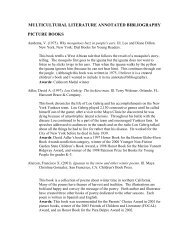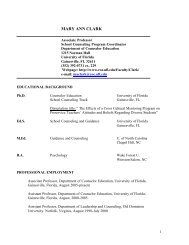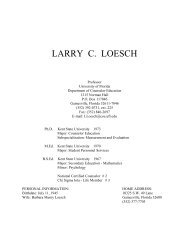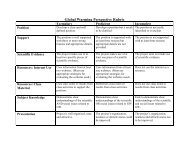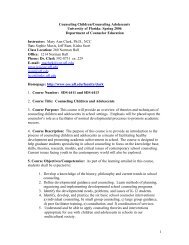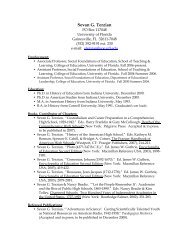The Effects of Distance Education on K-12 Student Outcomes: A ...
The Effects of Distance Education on K-12 Student Outcomes: A ...
The Effects of Distance Education on K-12 Student Outcomes: A ...
Create successful ePaper yourself
Turn your PDF publications into a flip-book with our unique Google optimized e-Paper software.
are inherently interesting and meaningful to the student. Web-based technology <str<strong>on</strong>g>of</str<strong>on</strong>g>fers a vast<br />
array <str<strong>on</strong>g>of</str<strong>on</strong>g> opportunities to help expand the c<strong>on</strong>ceptual and experiential background <str<strong>on</strong>g>of</str<strong>on</strong>g> the student<br />
(Bolt<strong>on</strong> 2002, p. 5).<br />
Neo-Piagetian theorists have expanded <strong>on</strong> Piaget’s model <str<strong>on</strong>g>of</str<strong>on</strong>g> cognitive development. Am<strong>on</strong>g<br />
others, Vygotsky proposed that historical and cultural c<strong>on</strong>text play significant roles in helping<br />
people think, communicate, and solve problems, proposing that cognitive development is<br />
str<strong>on</strong>gly linked to input from others. Vygotsky’s theory implies that cognitive development and<br />
the ability to use thought to c<strong>on</strong>trol our own acti<strong>on</strong>s require first mastering cultural<br />
communicati<strong>on</strong> systems and then learning to use these systems to regulate our own thought<br />
process. He believed that learning takes place when children are working within their z<strong>on</strong>e <str<strong>on</strong>g>of</str<strong>on</strong>g><br />
proximal development. Tasks within the z<strong>on</strong>e <str<strong>on</strong>g>of</str<strong>on</strong>g> proximal development are <strong>on</strong>es that children<br />
cannot yet do al<strong>on</strong>e but could do with the assistance <str<strong>on</strong>g>of</str<strong>on</strong>g> more competent peers or adults (Slavin<br />
2003, p. 43-44). When working with children using web-based technology, teachers must <str<strong>on</strong>g>of</str<strong>on</strong>g>fer<br />
students activities that make use <str<strong>on</strong>g>of</str<strong>on</strong>g> the web’s powerful tools for collaborative learning, and are<br />
within their z<strong>on</strong>e <str<strong>on</strong>g>of</str<strong>on</strong>g> proximal development. Online communities can provide a supportive<br />
c<strong>on</strong>text that makes new kinds <str<strong>on</strong>g>of</str<strong>on</strong>g> learning experiences possible (Bruckman 1998, p. 84-85).<br />
C<strong>on</strong>structivism, a widely used theory in distance educati<strong>on</strong>, is founded <strong>on</strong> the premise that by<br />
reflecting <strong>on</strong> our experiences we c<strong>on</strong>struct our understanding <str<strong>on</strong>g>of</str<strong>on</strong>g> the world we live in. Each <str<strong>on</strong>g>of</str<strong>on</strong>g> us<br />
generates our own "rules" and "mental models," which we use to make sense <str<strong>on</strong>g>of</str<strong>on</strong>g> our experiences.<br />
Learning, therefore, is simply the process <str<strong>on</strong>g>of</str<strong>on</strong>g> adjusting our mental models to accommodate new<br />
experiences (Brooks & Brooks 1993). Children have not had the experiences that adults have had<br />
to help them c<strong>on</strong>struct understanding. <str<strong>on</strong>g>The</str<strong>on</strong>g>refore, children c<strong>on</strong>struct an understanding <str<strong>on</strong>g>of</str<strong>on</strong>g> the<br />
world around them that lacks the rich experiences that adults have had. Scaffolding or mediated<br />
learning is important in helping children achieve these cognitive understandings (Slavin 2003, p.<br />
259), and are essential comp<strong>on</strong>ents <str<strong>on</strong>g>of</str<strong>on</strong>g> web-based learning experiences for children.<br />
With the emphasis <strong>on</strong> scientifically-based research and the call for evidence-based program<br />
decisi<strong>on</strong>s in the federal No Child Left Behind Act <str<strong>on</strong>g>of</str<strong>on</strong>g> 2001, detailed knowledge is needed to<br />
guide the growing numbers <str<strong>on</strong>g>of</str<strong>on</strong>g> cyber/<strong>on</strong>line/virtual school developers and educators. Metaanalysis<br />
is an established technique for synthesizing research findings to enable both a broader<br />
basis for understanding a phenomen<strong>on</strong> and a parsing <str<strong>on</strong>g>of</str<strong>on</strong>g> influences <strong>on</strong> the phenomen<strong>on</strong>. Several<br />
recent meta-analyses related to distance educati<strong>on</strong> have been published in recent years (Table 1).<br />
Table 1. Summary <str<strong>on</strong>g>of</str<strong>on</strong>g> recent meta-analyses in distance educati<strong>on</strong><br />
Author(s), Date Focus N <str<strong>on</strong>g>of</str<strong>on</strong>g> studies Effect Size<br />
Allen, Bourhis, <strong>Student</strong> satisfacti<strong>on</strong> 25 +0.031<br />
Burrell, Mabry, 2002. am<strong>on</strong>g adult learners<br />
Bernard, Abrami, <strong>Student</strong> achievement, 232 +0.0<strong>12</strong>8<br />
Lou, Borokhovski,<br />
Wade, Wozney,<br />
Wallet, Fiset, Huang,<br />
2003.<br />
attitude, retenti<strong>on</strong><br />
5 <str<strong>on</strong>g>of</str<strong>on</strong>g> 32



